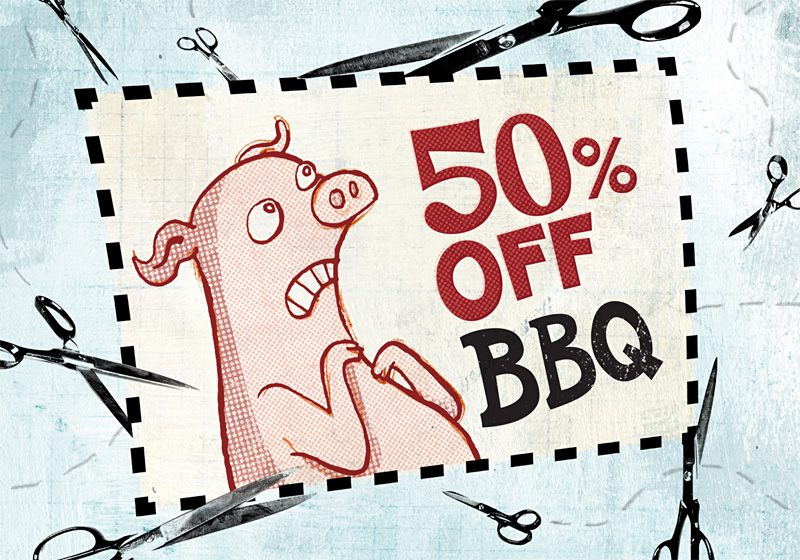When Terra Organics owner Dan Hulse contacted Groupon.com to arrange a promotional coupon for discounted produce, he expected maybe 300 new customers to take advantage of the deal. Two months later, he’s still trying to meet the 1,200 orders he received in the hours after the coupon went live.
A similar thing happened at the Waterwheel, a barbecue-centric dive bar in Ballard. “It was a madhouse; it was crazy,” says owner Stu Weitzman. Last May, the Waterwheel offered better-than-half-off barbecue through Groupon, a $10 coupon for $25 in food. “The day after the coupon went out, we were slammed. We sold 1,004 coupons in total.”
In a cyber-landscape oversaturated with advertising and self-promotional foam from Twitter and Facebook, old-school coupons have started to dominate again, albeit in a new, high-tech way.
“The visibility is priceless,” Weitzman says. “We’re a little hole-in-the-wall off 15th. Most people didn’t know us, but we got a ton of business from this.”
Broadly, online coupons work the same as the clip-and-save variety: Get customers in the door by offering limited quantities of deeply discounted items, and hope some of them become regulars. But with the rise of smart phones, online coupons have taken a massive leap forward. Through services such as Groupon.com, LivingSocial.com, Tippr.com, and Dealpop.com, subscribers receive daily limited-time offers directly on their phones or computers (Seattle Weekly‘s online store includes similar offers). Subscribers can then forward, post, buy, or ignore the deals. Most offer, at a minimum, a 50 percent discount, and are typically only available to purchase for 24 hours. The coupons themselves, once purchased, are valid for months.
Some services, such as Groupon, require a minimum number of takers before a deal is valid. The businesses get exposure to a guaranteed subscriber list of customers who actually want daily online deals, as opposed to spamming services. In exchange, those businesses split coupon-sales revenue with the lister, such as Groupon.
For example, when Terra Organics offered $50 of produce delivery for $25 through Groupon.com, Hulse’s Tacoma-based company received $12 for each sale, well below the break-even point for a box of organic produce delivered to customers’ doorsteps. Groupon received the other $13.
Hulse and others say they are willing to trade short-term losses for the possibility of new customers. “We’d never had any promotion that got us so much visibility,” Hulse says. “It definitely exceeded our expectations.”
However, some customers get angry when an overbooked business can’t redeem coupons immediately, and often demand their money back.
“You might lose them forever,” Hulse concedes.
Stacy Koontz, a market consultant for LivingSocial, which has 155,000 subscribers in Seattle alone, agrees that the response to online coupons can be overwhelming. “Before we agree to carry a coupon,” says Koontz says, “we sit down with the business owners and make sure they are ready for the response.”
Food dominates, but not all deals are meals. LivingSocial offers approximately two restaurant and bar coupons per week, but otherwise focuses on activities such as discount trapeze lessons or yoga classes. Dealpop promotes White Pages businesses. And Tippr does everything from bars to spas.
But the biggest player is Groupon. With 250,000 subscribers in Seattle, the Chicago-based company focuses primarily on bistros, bars, and entertainment. Founded two years ago, Groupon has been valued at more that $1.2 billion, and offers deals in 185 markets in 22 countries. The Seattle region is a top-five market, says Groupon spokesperson Julie Mossler.
Count Carrie Atwood among the reasons why. Atwood, a 36-year-old mom, says she sees her Groupon offer every morning when she looks at her iPhone. “I’ve used it for things I might not otherwise purchase,” she says. “They had a helicopter tour deal, which is not something I would normally do. But it wound up being a Father’s Day gift for my husband.”
The Waterwheel’s Weitzman says that’s the point of the coupon: It’s a bet that you’ll try a new place if it’s cheap enough, then come back if it’s good. Weitzman admits he was a bit dubious at first. Now he’s a true believer. “So maybe I lose $1,000 on the initial deal, right? But how many of those people spent more than their coupon? How many will come back? There’s no other way I could spend that money and get the same response. It was great.”
Terra Organics’ Hulse agrees—to a point. “I think the model maybe works better for a bar or a restaurant,” he says.
Local produce isn’t ready all at the same time, he explains. And there’s simply no way to honor every coupon within a week or even a month—some customers didn’t receive deliveries until two months after their Groupon coupon was purchased, Hulse says.
Most customers were satisfied, especially when they saw the quality of the food. A handful of others wanted their money back. It’s too early to say how many happy customers will subscribe for regular deliveries. And that, in the end, is the key figure, says Hulse.
“Was it worth it to us?” Hulse asks. “It’s too early to say. I certainly hope so.”






